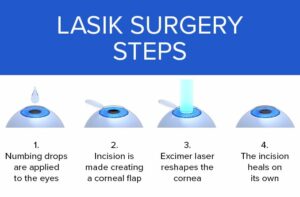Lasik surgery is a vision correction procedure that allows people to see clearly without the need for glasses or contact lenses. This article covers what you need to know about the surgery, from the pre-surgery preparation and post-surgery care to potential risks and side effects. Find out here if Lasik surgery is right for you!
Contents
What is Lasik Surgery?

Lasik surgery is a type of refractive surgery that is used to correct vision problems. It is a very popular procedure that has helped millions of people improve their vision.
It works by changing the shape of the cornea, which is the clear, outermost layer of the eye. This change in shape helps to refocus light so that it hits the back of the eye (the retina) in the right place. This results in clearer vision.
The surgery itself is usually quick and painless. It is typically done on an outpatient basis, which means you can go home the same day as your surgery. Recovery from Lasik surgery is generally quick and easy, with most people noticing an improvement in their vision within a few days.
If you are considering Lasik surgery, it is important to talk to your doctor about whether or not it is right for you. There are certain risks and side effects associated with any type of surgery, so it is important to make sure that you are aware of them before making any decisions.
Types of Lasik Surgery
There are two types of Lasik surgery: traditional Lasik and custom Lasik. Traditional Lasik is the most common type of surgery and is performed with a laser that reshapes the cornea to correct refractive error. Custom Lasik is performed with a femtosecond laser, which creates a precise, thin flap in the cornea. This type of surgery is often used to treat more complex refractive errors, such as astigmatism.
In addition, there are other laser-based eye surgeries available such as PRK (photorefractive keratectomy), LASEK (laser epithelial keratomileusis) and SMILE (small incision lenticule extraction). Each of these procedures has its own benefits and risks and should be discussed with a surgeon before making a decision.
Risks and Benefits of Lasik Surgery
There are both risks and benefits to Lasik surgery. The risks include:
- The possibility of losing vision
- The possibility of developing eye infections
- The possibility of dry eyes
- The possibility of experiencing halos or glare around lights
The benefits of Lasik surgery include:
- Reduced dependence on glasses or contact lens
- Convenience and increased freedom
- Reduced risk of eye injury from contact lenses
- More natural vision, with the ability to see near and far without assistance.
Overall, LASIK surgery is generally considered safe and effective for those who are eligible. It is important to discuss your personal medical history with an eye care professional in order to determine if LASIK surgery is right for you.
How Much Does Lasik Surgery Cost?
Lasik surgery is an outpatient procedure that can correct a number of vision problems. The cost of this surgery can vary depending on a number of factors, including the type of vision problem being treated, the severity of the problem, and the experience of the surgeon. In general, LASIK surgery costs between and per eye.
It is important to note that many insurance companies do not cover the cost of Lasik surgery, so it is important to check with your insurer before scheduling the procedure. Additionally, some eye care providers may offer financing options for those who cannot afford to pay the full cost upfront.
Who Can Get Lasik Surgery?
Lasik surgery is a procedure that has been used to correct vision for over two decades. It is a safe and effective way to improve your vision. While Lasik surgery is not right for everyone, there are many people who can benefit from this type of procedure. It can be used to treat a variety of different refractive errors including nearsightedness, farsightedness, and astigmatism.
If you are considering this surgery, the first step is to schedule a consultation with an experienced eye surgeon. During your consultation, your surgeon will perform a thorough eye exam and review your health history. They will also discuss your goals for surgery and answer any questions you may have. Based on this information, they will determine if you are a good candidate for it.
- Generally, this is the most successful in people who:
- Are at least 18 years old
- Have had a stable eyeglass or contact lens prescription for at least two years
- Do not have any other serious eye conditions
Are not pregnant or nursing
If you meet these criteria and are interested in improving your vision, it may be right for you. To learn more about this procedure and whether it is right for you, schedule a consultation with an experienced eye surgeon today.
Alternatives to Lasik Surgery
There are a number of alternative refractive surgeries available to patients who are not good candidates for Lasik or who simply prefer another type of procedure. These include:
PRK ( photorefractive keratectomy ): This is the original refractive surgery, pre-dating for several years. It works by removing a small amount of tissue from the cornea with a laser, which then reshapes the cornea and corrects the vision problem. The main advantage of PRK over Lasik is that there is no risk of flap complications, as there is with Lasik. However, it does have a longer recovery period than Lasik, and patients may experience some discomfort and visual disturbances during recovery.
This is the original refractive surgery, pre-dating Lasik for several years. It works by removing a small amount of tissue from the cornea with a laser. Then reshapes the cornea and corrects the vision problem. The main advantage of PRK over Lasik is that there is no risk of flap complications, as there is with Lasik. However, it does have a longer recovery period than Lasik. Patients may experience some discomfort and visual disturbances during recovery. LASEK ( laser epithelial keratomileusis )
This procedure is similar to PRK in that it involves the removal of a small amount of tissue from the surface of the eye (the epithelium). However, instead of using a laser to remove the tissue, the surgeon uses a special instrument called an epikeratome. This procedure is best for people with thin corneas or those who are not suitable candidates for Lasik.
This procedure is similar to PRK in that it involves the removal of a small amount of tissue from the surface of the eye (the epithelium). However, instead of using a laser to remove the tissue, the surgeon uses a special instrument called an epikeratome. This procedure is best for people with thin corneas or those who are not suitable candidates for Lasik. ICL ( implantable collamer lens: This is a newer type of refractive surgery that does not involve cutting the cornea. Instead, an artificial lens is implanted inside the eye, which then corrects vision problems. It is best for people with higher levels of near-sightedness or astigmatism who may not be suitable candidates for Lasik or PRK.
This is a newer type of refractive surgery that does not involve cutting the cornea. Instead, an artificial lens is implanted inside the eye, which then corrects vision problems. It is best for people with higher levels of near-sightedness or astigmatism who
Conclusion
It may be concluded that all about Lasik surgery is a complex process. It involves many steps and must be done carefully to ensure the best results. The success of Lasik surgery depends on several factors such as the type of procedure. The patient’s overall health, the skill of the surgeon and the skill of the support team. While LASIK surgery is generally considered safe, there are risks involved that should be understood before making a decision. Patients should also make sure they understand all aftercare instructions. They follow them closely to help ensure successful outcomes from their procedures. It is important to discuss these topics with a qualified eye doctor who specializes in this type of surgery before making any decisions. With proper preparation and educated decision-making, it may be possible for some people to benefit from Lasik Surgery and experience improved vision without glasses or contact lenses.
Lasik Surgery is a serious and life-altering decision that requires considerable research and deliberation. Patients should be sure to ask all the questions they have about Lasik Surgery before undergoing the procedure. They should also make sure to find a qualified eye doctor who specializes in this type of surgery. They can provide them with the best care possible. It is important to remember that while Lasik Surgery may be an effective way of improving vision, it is not a guarantee of perfect vision or freedom from corrective lenses. As with any medical procedure, there are risks involved and patients should understand these before making their decision. Ultimately, each patient must weigh the pros and cons for themselves before choosing to undergo Lasik Surgery.
Lasik surgery is a safe 10-minute procedure to help you get rid of glasses. MantraCare offers the most advanced Lasik options. If you have any questions on lasik surgery feel free to reach out to us at +91-9711116605. We provide effective Lasik surgery in Delhi.
